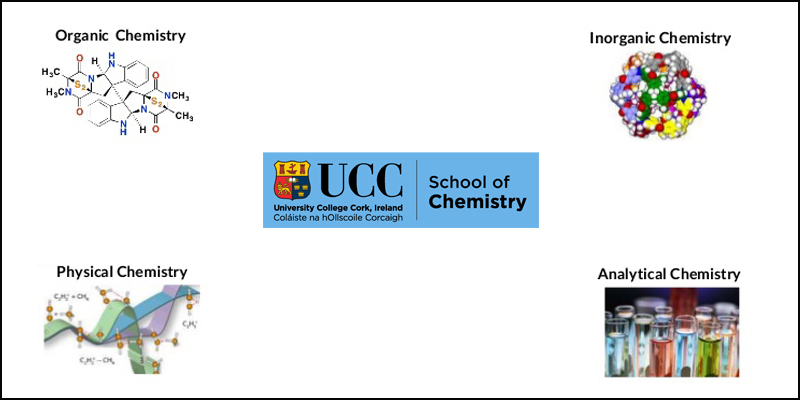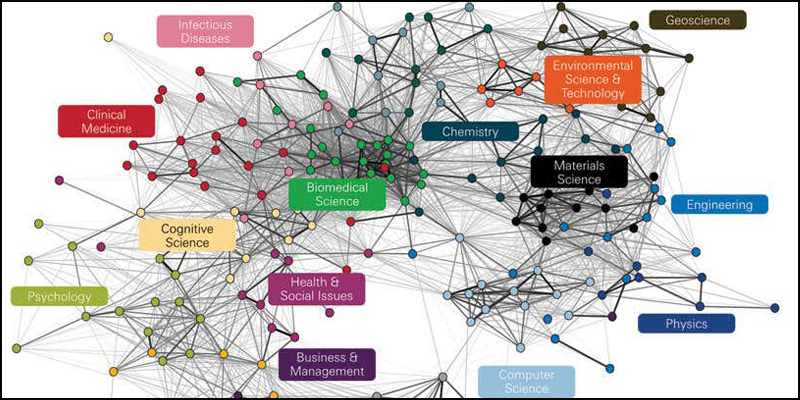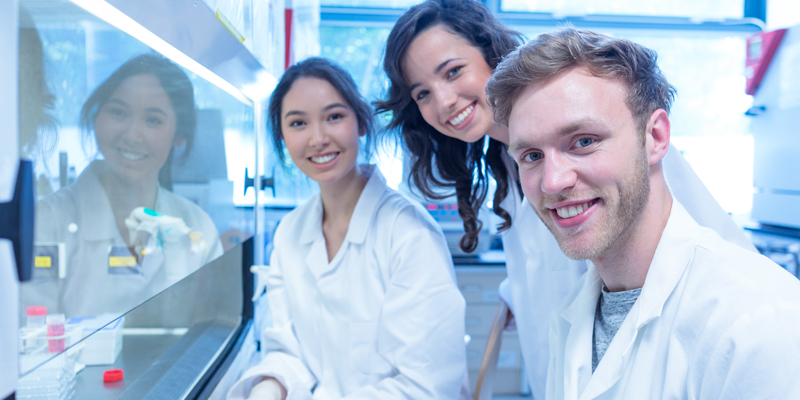In This Section
Summary of Page Options
Areas of Chemistry
Chemistry is traditionally divided into four sub-disciplines.
- Organic Chemistry deals with molecules formed predominantly from carbon, hydrogen, oxygen, and nitrogen bonds. Owing to the strength of carbon-carbon bonds, the range and diversity of organic molecules is enormous – literally millions of molecules have been identified.
- Inorganic Chemistry deals with molecules composed of other elements and where carbon-carbon bonds are not as important. Typical examples are many salts, metals, semiconductors, and nanomaterials.
- Analytical Chemistry has the function of the analysis and quantification of chemical components of a sample. Chemical analysis is increasingly important to ensure the quality of manufactured goods, and in monitoring pollutant concentrations in our air, water, and food. Very low amounts of pollutants (such as mercury or dioxins) can harm human health or the environment.
- Physical Chemistry describes the physical properties, energies, and spectra of all types of molecules (whether organic or inorganic), and how rapidly chemical reactions occur. Physical chemists typically use spectroscopy or computational methods to study molecules, surfaces, and chemical reactions.

While the traditional divisions in chemistry remain important, much of the most exciting scientific research is interdisciplinary in nature. The central status of chemistry means that it intersects with many other scientific and technical fields including physics, biology, pharmacology, materials science, environmental science, and engineering. Indeed, chemistry is absolutely essential to advancing our knowledge at the borders between these disciplines and to produce solutions to contemporary problems. Research groups in the School of Chemistry collaborate closely with many groups in other departments to form a strong core of interdisciplinary research. We have particularly strong interdisciplinary research in materials and nanotechnology, pharmaceutical chemistry, and environmental research.

One of the strengths of the School of Chemistry at UCC is the strong exposure our undergraduate students get to the four core sub-disciplines in chemistry. At the same time, our extensive interdisciplinary work gives our students a wider perspective on the central role of chemistry in cutting-edge science and technology. We believe that this broad and deep training in the molecular structure of nature allows our students to decide which parts of chemistry most interest them, and hence to make informed choices about how to develop their career further.
Careers in Chemistry
Chemistry provides a scientific understanding of the fundamental properties and behaviour of all matter. As such, chemistry forms the basis of many hitech industries, including the pharmaceutical and advanced materials industries, and new, emerging fields such as fuel cells, biosensors, and thin film technology. The breadth of the subject means that chemistry is essential in most areas of science and technology and there is a broad spectrum of career options for chemistry graduates.

Chemistry graduates from University College Cork are in high demand in Ireland and abroad. Few industries are more profitable, pay as well and are as recession proof as the pharmaceutical and chemical industries and these continue to be growing sectors in the economy. All these sectors rely heavily on chemistry graduates for their future growth. Chemists are employed in product development and process research, quality control and assurance, as well as environmental monitoring and control. A chemistry degree also teaches the skills required in areas as diverse as electronic manufacturing, the food industry, and government laboratories.

In addition, most chemical companies offer in-house training in management, finance control, sales and patents, and careers may be developed in non-chemistry directions. Careers in teaching, hospitals, management or business are all possible for chemistry graduates, who are known for their analytical, numerical, and practical training. Many of our graduates find that they want to contribute actively to expanding and applying scientific knowledge, and choose to pursue doctoral research.
Study Chemistry at UCC
The School of Chemistry at UCC offers a number of undergraduate degree options, taught Masters and PhD degrees. Follow the links below to find out more about these opportunities.
The following courses are fully accredited by The Royal Society of Chemistry:
- BSc Chemistry
- BSc Chemistry of Pharmaceutical Compounds
- BSc Chemistry with Forensic Science
- MSc Pharmaceutical Analysis
- MSc Analytical Chemistry
- MSc Environmental Analytical Chemistry
And the following courses are fully accredited by The Institute of Chemistry of Ireland:
- BSc Chemistry
- BSc Chemistry of Pharmaceutical Compounds
Undergraduate Chemistry Courses
Taught Postgraduate Chemistry Courses
Postgraduate (PhD) Research Degrees
School of Chemistry
Scoil na Ceimic
Contact us
Second Floor, Kane Building, University College Cork, T12 YN60
